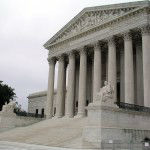Supreme Court Kicks Off Historic Agenda: Part II

Since embarking on a new term earlier this month, the Supreme Court has already considered a number of significant issues, including the future of affirmative action and corporate liability for human rights abuses overseas. In addition, the Court shows no signs of slowing down, adding a number of important cases to its docket in recent weeks.
Building on our Supreme Court preview from last week, below are several other key cases on deck for this term:
Alleyne v. U.S.: The Supreme Court will consider whether to further reform criminal sentencing requirements. In Harris v. United States, the Court previously held that the Constitution did not require that a jury (rather than a judge) find the facts necessary to impose a mandatory minimum sentence. However, it is now poised to reconsider that decision.
Kirtsaeng v. John Wiley & Sons: The Supreme Court will consider whether it is illegal to purchase copyrighted material abroad and then resell it in the United States. Under the “first sale doctrine,” the owner of a copy “lawfully made” under U.S. copyright laws is allowed to sell or otherwise dispose of the copy without the copyright owner’s permission; however, copyright owners contend that this doctrine should not apply to the growing “gray market” in which products are purchased at a lower cost overseas and then resold in the U.S. for a profit.
Clapper v. Amnesty International USA: The Supreme Court will consider a provision of the Foreign Intelligence Surveillance Act that allows the government to conduct electronic surveillance of persons reasonably believed to be located outside the United States to acquire “foreign intelligence information.” The specific question before the Court is whether the groups challenging the constitutionality of the law have standing because they are not likely to be targeted for surveillance.
Bowman v. Monsanto Co.: The Supreme Court will consider the issue of patent exhaustion, which delimits rights of patent holders by eliminating the right to control or prohibit use of the invention after an authorized sale. This case is a classic example of the little guy vs. the big guy, pitting an Indiana soybean farmer against the world’s largest seed company.
For a preview of several Supreme Court cases focusing on public law issues, we invite you to check out the Scarinci Hollenbeck Government & Law Blog.
Previous Articles
SCOTUS Wraps Up Oral Arguments for the Term
by DONALD SCARINCI on May 17, 2022
The U.S. Supreme Court has concluded its oral arguments for the October 2021 Term. The justices hea...
SCOTUS Rules Censure of Elected Board Member Didn’t Violate First Amendment
by DONALD SCARINCI on May 10, 2022
In Houston Community College System v. Wilson, 595 U.S. ____ (2022), the U.S. Supreme Court held th...
Supreme Court Breach Is Not the First Involving Roe v. Wade
by DONALD SCARINCI on
The recent disclosure of Justice Samuel Alito’s decision purporting to overturn Roe v. Wade is ar...
The Amendments
-
Amendment1
- Establishment ClauseFree Exercise Clause
- Freedom of Speech
- Freedoms of Press
- Freedom of Assembly, and Petitition
-
Amendment2
- The Right to Bear Arms
-
Amendment4
- Unreasonable Searches and Seizures
-
Amendment5
- Due Process
- Eminent Domain
- Rights of Criminal Defendants
Preamble to the Bill of Rights
Congress of the United States begun and held at the City of New-York, on Wednesday the fourth of March, one thousand seven hundred and eighty nine.
THE Conventions of a number of the States, having at the time of their adopting the Constitution, expressed a desire, in order to prevent misconstruction or abuse of its powers, that further declaratory and restrictive clauses should be added: And as extending the ground of public confidence in the Government, will best ensure the beneficent ends of its institution.




